By Santa Clara Law students Katharine McCallum, Camilla Amato, and Christina Santora, and Prof. Francisco Rivera
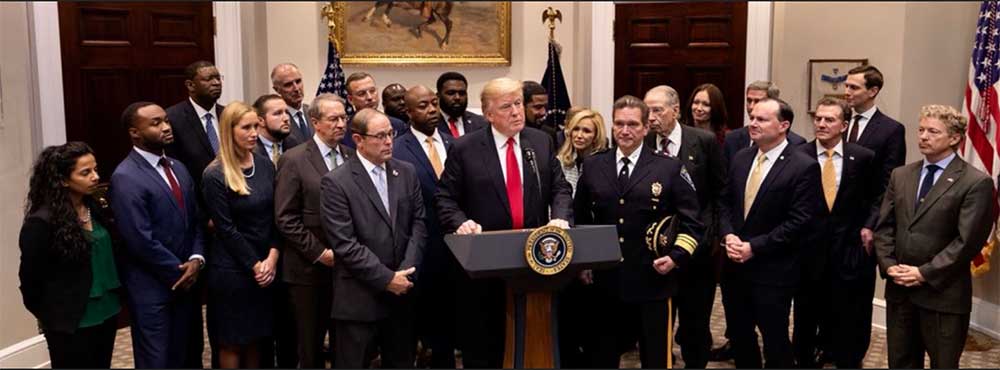
Jessica Jackson JD ’11 with Pres. Trump signing the First Step Act.
Beginning in January of 2019, International Human Rights Clinic students Katharine McCallum, Camilla Amato, and Christina Santora researched the First Step Act and analyzed its potential benefit on behalf of a current federal prisoner who was referred to the clinic by Santa Clara Law Prof. David Sloss. The First Step Act is a federal law enacted in 2018 that reforms the federal prison system and seeks to reduce recidivism. Among other provisions, the act retroactively applies the Fair Sentencing Act to reduce certain sentences, increases the number of good conduct time credits federal prisoners may receive, restricts the use of restraints on pregnant women, and relocates prisoners closer to family.
The First Step Act is divided into six sections. The first section of the act addresses recidivism reduction – the tendency of convicted individuals to reoffend. The rate at which federal prisoners who have been released from prison and then quickly re-entered the system in the U.S. has heavily escalated in the last ten years. Statistics from the U.S. Department of Justice show that five out of six prisoners who were released from prison in 2005, were then arrested again at least once during a 9 year period following their release.1 Based on these statistics, Title I of the First Step Acts seeks to reduce recidivism. The main reform component of Title I is the establishment of new programming and activities within prisons, as well as the creation of incentives for federal inmates who decide to participate in such programs and activities.
This is how the First Step Act should work in practice: under Title I, the Attorney General needs to review existing recidivism reduction programs, conduct research, collect data on such programs and productive activities, and their successes in reducing recidivism,2 and then develop recommendations for the creation of a new Risk and Needs Assessment System, a system that will assess the risks and needs of people in detention, and will help develop and implement evidence-based recidivism reduction programs and productive activities for federal inmates. 3 Then, in collaboration with the Bureau of Prisons and the Independent Review Committee (IRC), 4 a special committee comprised of individuals who have “expertise in risk and needs assessment systems”, 5 the Attorney General needs to develop and release this new Risk and Needs Assessment System by July 20th, 2019. 6 The First Step Act also has some built-in safeguards. For example, the legislation provides that the new risk and needs assessment system will take into account dynamic factors (such as what programming the person in prison has done or how many write ups the person has had in the past year), and give less weight to static factors such as prior criminal history. 7
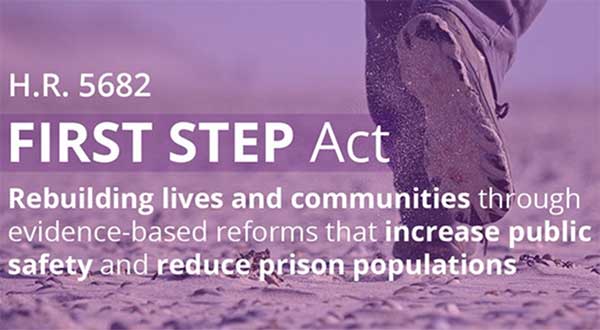
The whole process has already faced some challenges, as the Independent Review Committee had not been appointed by its January 21st, 2019 deadline because of the government’s shutdown. 8 As of April 8, 2019, six individuals have agreed in principle to serve on the Committee, but additional details still need to be announced by the Depart of Justice. 9 Once the IRC is fully appointed, there is still some hope they will meet the July 20th, 2019 deadline to release the new Risk and Needs Assessment System. 10 However, even though the deadline has not yet passed, it is likely the process will be delayed. 11
All people in federal prisons will automatically go through the Risk and Needs Assessment System, 12 will be assigned one of four categories (high risk, medium risk, minimum risk, and low risk), 13 and will get matched with recidivism-reduction programs and productive activities that are focused on skill-building, education, and vocational training. 14 Once assigned to specific recidivism-reduction programs, participation in such programs and productive activities is not mandatory. 15 Nonetheless, people in federal prisons will be given incentives to participate in these programs, 16 which include: time credits (good time credits and earned time credits), 17 being moved to a facility within a 500-mile drive to his or her family, 18 phone and visitation privileges, 19 more opportunities to access his or her email, potential transfer to preferred housing units, other incentives solicited from prisoners if determined appropriate by the prison’s director, 20 getting an ID when the person leaves prison, 21 and having an escrow account set up for him or her so that when the person leaves prison they have money aside. 22 Programming will be lead by faith groups, as well as private entities, non-profit groups, and volunteers (also formerly incarcerated people).23 Not all prisoners will be able to benefit from all incentives as, according to the specific conviction, some prisoners may be deemed ineligible.
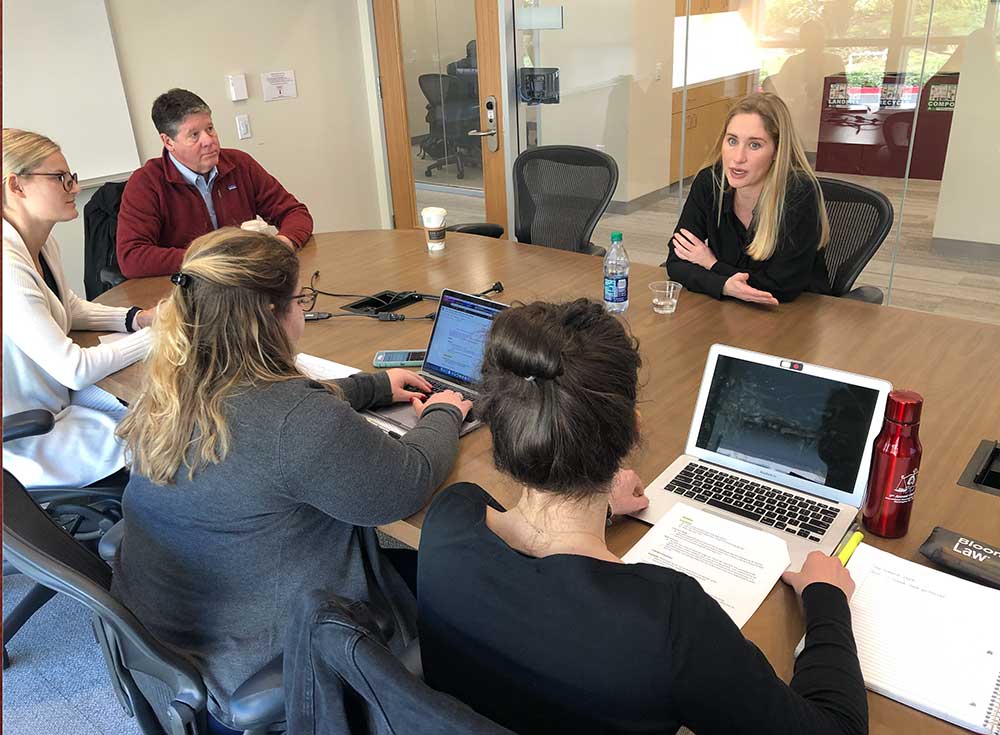
Clinic students Katharine McCallum, Christina Santora, and Camilla Amato
interviewing Jessica Jackson JD ’11 and her father.
Unfortunately, the individual who’s case the clinic is analyzing under the First Step Act is ineligible for some of these benefits due to the types of crimes for which he was convicted. The First Step Act targets low-level drug offenders who were convicted for involvement with cocaine-based substances, but this individual was convicted under 21 U.S.C. 841(a)(1) and 18 U.S.C. 924(c) for offenses involving methamphetamine and unlawful possession of a firearm. Consequently, some of the incentives and benefits in the act will not apply to this individual. The upside is that certain facilities will have better programming for the whole prison population and there is a potential that this individual could be moved to a facility with better programs, and possibly closer to home. The determining factor for benefit eligibility is the level of risk he is considered to have, whether high, medium, minimum or low risk. Only those federal prisoner who are considered low or minimum risk will be eligible for transfer.
Title IV of the Act focuses on sentencing reform. Title IV reduces the sentences imposed for low level drug offenses. Title IV updates the definition of covered offenses under the Fair Sentencing Act of 2010. Covered offenses are low-level drug offenses that violated the Controlled Substances Act and whose penalties are provided in section 2 or 3 of the Fair Sentencing Act.
To qualify as a covered offense, the violation must have also been committed before August 3, 2010. The individual on who’s case we have focused was arrested on August of 2005. Therefore, his case falls within the timeline of charges that Title IV is meant to protect.
Nevertheless, the sections of the Fair Sentencing Act to which the First Step Act applies its sentence reform deal mainly with drug offenses involving a cocaine-based substance. According to Title IV of the act, a current federal prisoner will likely not have their sentence reduced if the type of drug offense they committed was not the specific type of drug with a cocaine base. If, on the other hand, a current federal prisoner was sentenced before August of 2010, for a drug offense with a cocaine base, then that prisoner is likely eligible for sentencing reform under Title IV of the First Step Act. In this sense, the Fair Sentencing Act is targeted at amending Section 401(b)(1) of the Controlled Substances Act.
The individual who’s case we were reviewing was sentenced specifically under section 401(a)(1). Since the Fair Sentencing Act only amended sections dealing with cocaine-based substances, and this individual was sentenced for offenses of methamphetamine substances, the sentencing reform of the First Step Act does not apply to his case.
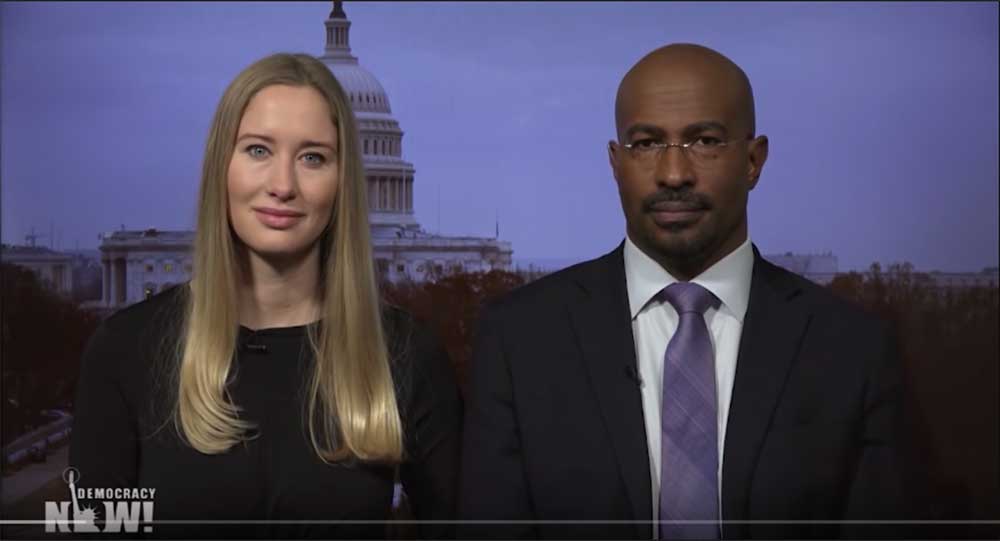
Jessica Jackson JD ’11 and Van Jones from Cut50
On a more personal note, we were very fortunate to have the opportunity to interview Santa Clara Law alumna and 2019 recipient of the Alexander Law Prize, Jessica Jackson. Ms. Jackson is a co-founder and national director of Cut50, an organization co-founded by Van Jones that was instrumental in drafting and advocating for the legislation and enactment of the First Step Act. She mentioned meeting with President Trump to discuss the bill and explained that he was very receptive to the idea of criminal justice reform. She spoke with us about the politics of pushing this bill through, about the goals for its implementation, and about the reality of how it should work day to day. Ms. Jackson provided us a wealth of knowledge and is truly an incredible and inspiring individual!
After spending an entire semester learning the ins and outs of this piece of criminal justice reform legislation, we all learned so much about what is being done to improve criminal justice in this country, and the steps that still need to be taken as we move into the next administration. This project was inspiring in unexpected ways, legally of course, but perhaps just as much politically as well.
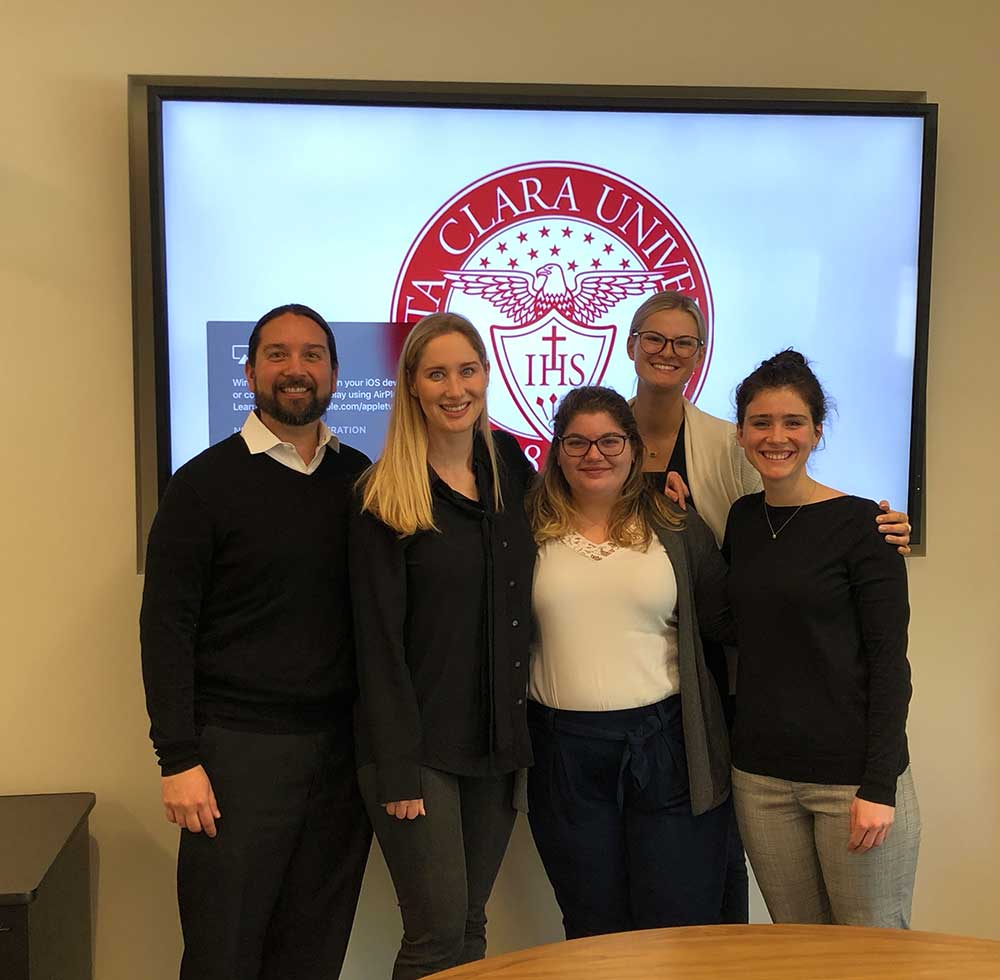
Prof. Francisco Rivera, Jessica Jackson JD ’11, and Santa Clara Law students
Christina Santora, Katharine McCallum, and Camilla Amato.
1 2018 Update on Prisoner Recidivism: A 9 Year Follow-Up Period, U.S. Department of Justice, May 2018.
2 First Step Act of 2018, S. 756, 115th Cong. §3631(b), (2017-2018).
3 First Step Act of 2018, S. 756, 115th Cong. §3632(a)-(b), (2017-2018); See also, U.S. DEP’T OF JUSTICE, DEP’T OF JUSTICE ANNOUNCES FIRST STEP ACT IMPLEMENTATION PROGRESS (2019), https://www.justice.gov/opa/pr/department-justice-announces-first-step-act-implementation-progress.
4 First Step Act of 2018, S. 756, 115th Cong. §3632(a), (2017-2018); See also, First Step Act of 2018, S. 756, 115th Cong. SEC.102(h), (2017-2018).
5 First Step Act of 2018, S. 756, 115th Cong. SEC.107, (2017-2018).
6 First Step Act of 2018, S. 756, 115th Cong. §3632, (2017-2018); See also, Jessica Jackson, FIRST STEP ACT PROJECT: INTERVIEW WITH EXPERT JESSICA JACKSON (2019) (on file with the Clinic).
7 Jessica Jackson, FIRST STEP ACT PROJECT: INTERVIEW WITH EXPERT JESSICA JACKSON (2019) (on file with the Clinic).
8 Jessica Jackson, 3 More Steps to Make “First Step Act” Work, The Hill, (Mar. 7, 2019), https://thehill.com/blogs/congress-blog/healthcare/433119-3-more-steps-to-make-first-step-act-work; See also, Jessica Jackson, FIRST STEP ACT PROJECT: INTERVIEW WITH EXPERT JESSICA JACKSON (2019) (on file with the Clinic).
9 U.S. DEP’T OF JUSTICE, DEP’T OF JUSTICE ANNOUNCES FIRST STEP ACT IMPLEMENTATION PROGRESS (2019), https://www.justice.gov/opa/pr/department-justice-announces-first-step-act-implementation- progress; See also, HUDSON INSTITUTE, HUDSON INSTITUTE TO HOST FIRST STEP ACT’S INDEPENDENT REVIEW COMMITTEE (2019), https://www.hudson.org/research/14945-hudson-institute-to- host-first-step-act-s-independent-review-committee.
10 Jessica Jackson, FIRST STEP ACT PROJECT: INTERVIEW WITH EXPERT JESSICA JACKSON (2019) (on file with the Clinic).
11 Jessica Jackson, FIRST STEP ACT PROJECT: INTERVIEW WITH EXPERT JESSICA JACKSON (2019) (on file with the Clinic).
12 Jessica Jackson, FIRST STEP ACT PROJECT: INTERVIEW WITH EXPERT JESSICA JACKSON (2019) (on file with the Clinic).
13 First Step Act of 2018, S. 756, 115th Cong. §3632(a)(1), (2017-2018).
14 First Step Act of 2018, S. 756, 115th Cong. §3632(a)(3)-(5), (2017-2018); See also, Jessica Jackson, FIRST STEP ACT PROJECT: INTERVIEW WITH EXPERT JESSICA JACKSON (2019) (on file with the Clinic).
15 Jessica Jackson, FIRST STEP ACT PROJECT: INTERVIEW WITH EXPERT JESSICA JACKSON (2019) (on file with the Clinic).
16 First Step Act of 2018, S. 756, 115th Cong. §3632(a)(6), §3632(d), (2017-2018).
17 First Step Act of 2018, S. 756, 115th Cong. §3632(d)(4), (2017-2018); See also, Jessica Jackson, FIRST STEP ACT PROJECT: INTERVIEW WITH EXPERT JESSICA JACKSON (2019) (on file with the Clinic).
18 First Step Act of 2018, S. 756, 115th Cong. Title VI: SEC.601(1), (2017-2018).
19 First Step Act of 2018, S. 756, 115th Cong. §3632(d)(1), (2017-2018).
20 First Step Act of 2018, S. 756, 115th Cong. §3632(d)(3), (2017-2018).
21 First Step Act of 2018, S. 756, 115th Cong. §3632(d)(2), (2017-2018); See also, Jessica Jackson, FIRST STEP ACT PROJECT: INTERVIEW WITH EXPERT JESSICA JACKSON (2019) (on file with the Clinic).
22 Jessica Jackson, FIRST STEP ACT PROJECT: INTERVIEW WITH EXPERT JESSICA JACKSON (2019) (on file with the Clinic).
23 Jessica Jackson, FIRST STEP ACT PROJECT: INTERVIEW WITH EXPERT JESSICA JACKSON (2019) (on file with the Clinic).